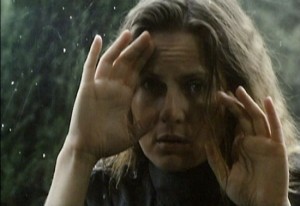From the Chicago Reader (March 1, 1996). — J.R.
Krzysztof Kieslowski’s major work (1990) consists of ten separate films, each running 50-odd minutes and set mainly around two high-rises in Warsaw. The films are built around a contemporary reflection on the Ten Commandments—specifically, an inquiry into what breaking each of them in today’s world might entail. Made as a miniseries for Polish TV before Kieslowski embarked on The Double Life of Veronique and the “Three Colors” trilogy, these concise dramas can be seen in any order or combination; they don’t depend on one another, though if you see them in batches you’ll notice that major characters in one story turn up as extras in another. One reason Kieslowski remains controversial is that in some ways he embodies the intellectual European filmmaking tradition of the 60s while commenting directly on how we live today. The first film, illustrating “Thou shalt have no other gods before me,” is about trust in computers; the often ironic and ambiguous connections between most subsequent commandments and their matching stories tend to be less obvious. (One of the 60s traditions Kieslowski embodies is that of the puzzle film, though he takes it on seriously rather than frivolously, as part of his ethical inquiry.) The fourth (“Honor thy father and mother”), for instance, one of my favorites, pivots around the revelation of feelings between a young acting student and the architect who may or may not be her real father, and the eighth (“Thou shalt not bear false witness”) focuses on the investigation of an American Jewish academic about why she was denied sanctuary from the Nazis when she was a little girl. (Episodes five and six were expanded into A Short Film About Killingand A Short Film About Love, which ends more effectively than its shorter version.) One of Kieslowski’s best ideas was to use a different cinematographer for each film (with the exception of the third and ninth, both shot by Piotr Sobocinski, who also shot Red), though the script—which he spent a solid year preparing with Krzysztof Piesiewicz, his regular collaborator—is more important here than the mise en scene, which isn’t the case in Kieslowski’s later films. Each segment is shaped like a well-constructed short story, often with a sardonic twist at the end, and though the performances—by many of the best actors in Polish cinema—are powerful, the direction is mainly a matter of realization rather than stylistic filigree. (JR)


